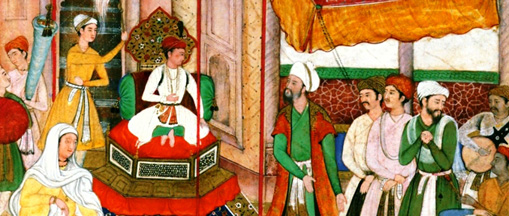Akbar the Great, benevolent dictator
By Amal Hewavissenti
Emperor Akbar appears to have believed that as an experienced
politician, he could have raised his political power as well as the
power of the nation. Above all, he was a valiant warrior and a splendid
general in the battlefield and he had an inexhaustible passion for war.
In spite of all this, emperor Akbar made every possible attempt to
replace any military victory by a peaceful victory which he knew would
earn him praise from a multi-religious community.
Akbar encouraged inter racial and inter tribal marriages by marrying
a Rajput princess and marrying his son to a Rajput lady. When he
inherited the throne of the empire from his father, he had barely turned
13. This child king was protected by Bayram Khan but soon Akbar took
upon himself all the affairs of the empire.
Power
Emperor Akbar ruled India for around a half century - a period which
witnessed the birth of William Shakespeare in England and the
Netherlands Revolution. As Moguls were strangers to India, they
controlled the people with military power.
|

Emperor Akbar ruled India for around a half century |
Here Akbar succeeded in infusing a local colour to Moguls and making
the Mogul dynasty a local dynasty with total Indian identity.
Even-though Akbar possessed immense political power, he relentlessly
worked for the betterment of Indians because he was a benevolent
dictator.
He is perhaps credited with the honour of unifying India which was
split apart by religious and racial discrepancies.
Akbar was a unique product of his time. In spite of his ethnicity and
religion, Hindus became powerful governors, brave warriors, and masterly
ministers in his vast empire. He appointed Rajamana Singh as the
governor for Kabul. Sometimes he privileged Hindus to the disadvantage
of the Muslims the people of his own ethnicity. This was to guarantee
racial and religious freedom in his empire.
This principle earned him a chorus of praise from Hindus and Rajputs.
Rathna Prathap Singh of Miwar a local leader never recognised the power
and authority of Akbar in India but engaged in fights with him. Finally
he was forced to recede to jungles and engage in hunting for the most
part of his life.
Rathna Prathap Singh was repeatedly defeated by Akbar's army and he
was resolute not to be humiliated by the 'foreign ruler'.
However, emperor Akbar gradually won the hearts of Rajputs and hosted
Persians and Jesuit missionaries in his palace.
Once local Muslim leaders protested against him because he violated
certain Islam policies.
Once a Jesuit priest who had been staying in Akbar's palace commented
"He (Akbar) has mastered in everything.
He pities the one who means extreme harm on him. He very rarely flew
into a temper and if he happens to be furious, he is sure to be
dangerous. But that fury lasts for a short time..."
Dangerous
Akbar with an unusual physical strength always preferred to hunt
dangerous animals. Once he crossed Rajputana desert with a small army,
to crush a rebellion which had broken out in Gujarat. It took him nine
days to reach Ahamabad through Raj Putana desert which was 400 miles
from the city of Agra. A Jesuit priest described him to be a man of
intense attraction and great personality. His eyes, as he described,
resembled the sea illuminated and brightened by the sunlight. As a great
conqueror, he gained the total control of territories and countries such
as Kashmir, Bengal, Orissa, Sindh and Gujarat.
Yet an indelible blackmark blemished his monarchial personality when
he conquered the territory ruled by a brave queen called Durgawathi.
Governed by a passion to extend his empire, Akbar battled against Queen
Durgawathi who in no way meant any harm on Akbar.
Again Akbar battled against the queen Chanad Bibi who ruled Ahamad
Nagar. Akbar managed to capture the city of Ahamad Nagar after a serious
battle. Here Chanad Bibi's forces offered a tremendous resistance to
Akbar's army. However, emperor Akbar was impressed by her bravery and
reestablished her on the throne of Ahamad Nagar. Later Chanad Bibi was
killed by a general of her army. Akbar showed great skill in selecting
the highest officials in the empire. Faizy and Abdul Hussain were the
two brothers who were the most trustworthy officials for emperor Akbar.
Jawaharlal Neru compared him to India's great emperor Asoka.
|

